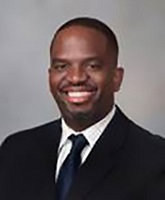Member Spotlight: Rondell Graham
 1. Name and affiliation:
1. Name and affiliation:
Rondell P. Graham, MBBS
2. What is your professional title?
Consultant pathologist and Professor of Lab Medicine & Pathology at Mayo Clinic. Section head for GI liver pathology, Vice chair of Research for Anatomic Pathology.
3. How did you decide to enter the field/what (or who) brought you into the field?
When I was in medical school, I attended a class on Familial Adenomatous Polyposis Coli and was absolutely blown away. I found it fascinating. The notion that there was some genetic abnormality that corresponded to a clinical phenotype. I was in Jamaica with minimal exposure to molecular technologies at the time and I didn’t know if it was realistic for me to pursue a career in pathology. I was nonetheless persuaded by the Faculty in Jamaica. When I came to Mayo in Rochester MN for pathology residency, I expressed my interest in pursuing a career in molecular and gastrointestinal pathology, and no one laughed me out of the room despite a virtually non-existent background. I was given the opportunity to participate in molecular genetics and wet bench research activities. Staff, on their own time, got me involved and supported me. This laid the foundation for me to gain acceptance to the molecular genetics fellowship. Since that time, I joined the staff at Mayo Clinic in 2016 and now I have the pleasure to do what attracted me to pathology in the first instance: gastrointestinal/liver pathology, and molecular pathology.
4. What do you do? How would you describe your role?
I would describe my role as that of a clinician engaged in research. Currently, I do GI/liver pathology sign out for about 60% of my effort. This entails diagnosing biopsies and evaluating tumor resections. The remainder of my time is evenly divided between administration – directing the GI/Liver pathology service and Research for Anatomic Pathology – and my own research. My research is focused on diagnosis and biomarkers of GI/Liver pathology with an emphasis on liver tumors.
5. What degree(s) and/or training did you receive to achieve your position?
I obtained my medical degree at the University of the West Indies, Mona Campus in Jamaica. Thereafter, I did my residency in Anatomic and Clinical Pathology at Mayo in Rochester, MN and then three fellowships: Molecular Genetic Pathology, Surgical Pathology, and then GI/Liver Pathology (all at Mayo Clinic).
6. What is the greatest challenge you face in your work?
Like everyone else, there are more good things to do than I can possibly see through to completion. My biggest challenge is identifying the best opportunities to invest my time in. The opportunities span research, education and administration. It is crucial that identify what mix what projects, activities and contributions would bring out the best in me and be of the greatest value to others.
7. What is the best part of your work as you see it? (most interesting, most fun…)
The best part of my work is the opportunity to provide answers for patients. Whenever we can make a diagnosis or an interpretation, we are answering a patient’s question. A lot of anxiety and concern for patients is not knowing exactly what is wrong; not knowing what the underlying cause for their ailment is. I find it really fulfilling that I can help provide answers. Periodically, I have the opportunity to communicate with patients directly. I also enjoy that immensely. It’s valuable for them to know that “the lab” refers to humans who hear, who are doing their best to understand and who care about their stories and their well-being.
8. Optional follow up question - what do you do for fun?
A lot of things. I’m a big Real Madrid soccer fan, so I follow them on all media outlets and have been to their stadium in Madrid. In line with that, I play some scrimmage soccer with my children, and assisted coaching soccer in the Fall a few times. We are also a Brazilian jiu jitsu family, my two sons are really into it. We have been participating for more than 4 years now. I hope my daughter will enjoy it as well.

















